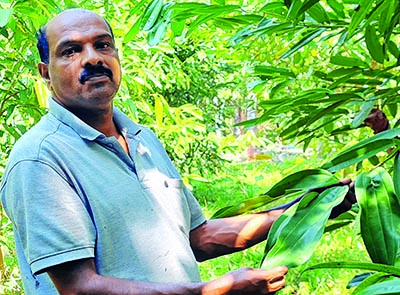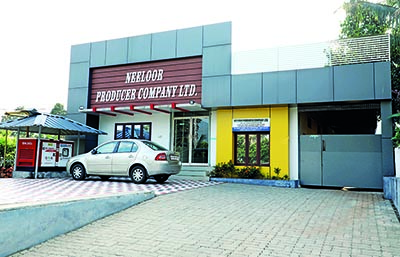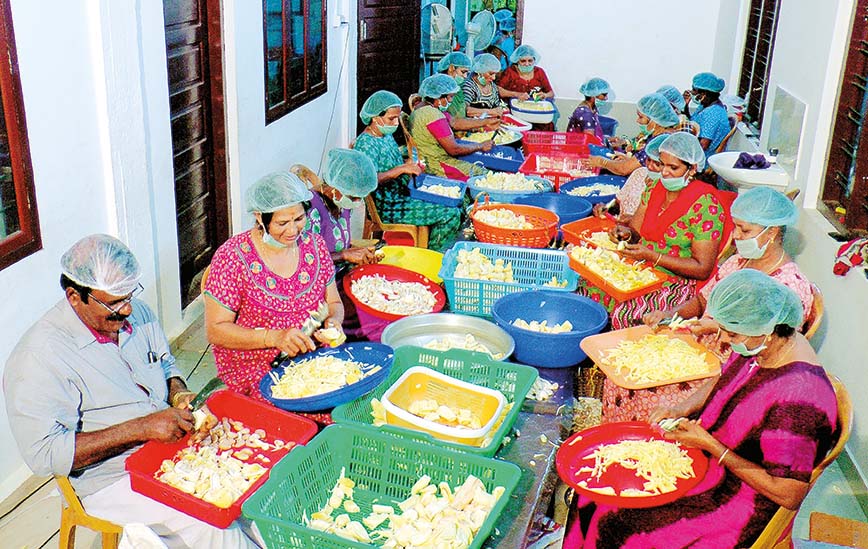
Kumbiliyappams being steamed
Jackfruit in dumpling is a winner in Kerala
Shree Padre, Kasaragod
A steamed dumpling made of ripe jackfruit, jaggery and rice flour wrapped in an aromatic leaf with the fragrance of cinnamon has begun to enjoy popularity as a snack. It is proving to be a winner for the Neeloor Producer Company (NPC), a farmer-producer organization (FPO) in Kottayam district of Kerala.
Called kumbiliyappam or chakka ada, the snack is a fusion of flavours particularly so because of the edana or vayana leaf which is redolent and tastes like cinnamon. It all adds up to a tasty, modestly priced and hugely successful snack that has brightened the prospects of the NPC, which was started in 2017 in Neeloor near Pala. It is now the biggest producer of kumbiliyappam. The company sells value-added jackfruit products as well, and is eyeing a turnover of Rs 2.5 crore next year.
Edana leaves, however, aren’t widely available. The leaf grows wild in the deciduous forests of the Western Ghats where it is gathered by tribals. Sometimes it is spotted growing in the backyards of houses near forests. Generally, it is an elusive leaf. It belongs to the cinnamon family, Cinnamomum malabatrum.
 |
|
Shaji Jose with edana plants in his farm |
The kumbiliyappam is also a decent source of income for a solitary farmer, Shaji Jose, who knocked down his rubber trees to plant the fragrant edana. The leaf now grows on his land. He then started a family business making kumbiliyappam.
Why has this traditional sweet risen in popularity? In the good old days, it was made at home. But it’s not nostalgia alone that sells kumbiliyappam. Unlike short eats at tea shops like vadas and puris which are oily, the kumbiliyappam is steamed and therefore appeals to the health-conscious consumer.
Its popularity has opened up the export market as well. For the past few months kumbiliyappam is being exported to the US, UK, Canada and West Asia. About half of the Neeloor Producer Company’s output is sold locally and the rest is frozen and exported.
The snack is called 'kumbiliyappam' because it is shaped like a cone. Kumbiliyappam means cone-shaped in Malayalam. Some people pack the dough between two folds of the leaf. This flat version is called chakka ada, with 'chakka' meaning jackfruit.
FROM TREE TO TABLE
After prices of rubber fell, Jose looked around for an alternative. He realized that edana had consistent demand and would fetch him decent revenue. So, five years ago, he cut down his rubber trees and replaced them with edana plants on his 3.5 acres in Thrissur district. No one has grown the leaf commercially, so far.
This also enabled him to begin his kumbiliyappam making business. Jose says he was fond of the traditional sweet. “During the jackfruit season, in my childhood, it was made regularly in my home. At night I’d eat lots of it instead of rice.”
Jose, who lives in Vettilappara in Patnamthitta district, also runs a small enterprise which makes sweets like peanut chikkis, sesame chikkis and ginger mithai.
Commercial production of kumbiliyappam is rare with the exception of Navya Bakery which has more than 40 branches in Ernakulam and Thrissur districts. They make this snack with jackfruit pulp in large quantities.
Last year Jose started producing kumbiliyappam with help from his family. They make it early in the morning and deliver it to tea shops. Kumbiliyappam has a shelf life of only one or two days so it has to be supplied on a daily basis. In a short time, Jose began making 600 kumbiliyappams per day.
Jose buys jackfruits and converts it into fresh pulp every day. “You won’t get the taste of fresh pulp in the kumbiliyappam available commercially. But in our sweet you will taste bits of the fresh fruit. It makes our snack taste more authentic,” he says. “We also put in a fairly large proportion of jackfruit pulp. Unlike others, we don’t stint on quantity.”
Jose made and sold kumbiliyappam for only a month and a half last year. One big advantage is that his son, Alan Jose, a graduate in food processing, understands the nuances of manufacturing.
Jackfruit is supplied to their doorstep by agents. The price varies according to the season. The flakes are removed, diced, cooked and stored in the deep freezer at night. The pulp is cooked the previous night. At 4 am, before dawn, seven women from the neighbourhood arrive and work till 7 am.
They make the dough — mixing rice flour, jaggery, cardamom, ginger and jeera into pulp. The edana leaves are washed and kept aside. The dough is filled into the leaves which are folded into cones and then steamed in an electrical steamer for 45 minutes. Around 1,000 kumbiliyappams can be steamed at a time. By 7 am, the sweet snack is ready for dispatch.
Alan now takes over. He loads the kumbiliyappam into his auto-rickshaw and supplies it to bakeries, tea shops and restaurants. The family sells 1,800 kumbiliyappams daily at Rs 15 each. The shops resell it at Rs 20. Alan travels around 150 km every day to supply the sweet.
It takes the edana plant three years to grow leaves suited for the snack. The leaves are carefully harvested. Jose has about 200 plants that are four to five years old. One plant yields 300 leaves. Every day he collects leaves from four to five plants. “Growth is slow. A plant requires a year to give leaves again,” he says. Jose selects cultivars with mild aroma for planting.
When the jackfruit season began this year, from April 15, Jose’s family began making kumbiliyappams. He hopes to produce the snack till the jackfruit season ends which is around August-end.
Kumbiliyappam is in demand through the year. After the jackfruit season is over, the family can continue production by stocking the pulp in a cold room but that requires considerable capital investment. There are export enquiries too, they say.
 |
|
The farmers now have an attractive office for their company |
The other alternative, says Alan, who has studied all the possibilities, is to outsource. “Blast freezers and a cold room are available in Kothamangalam. We can avail of these services for a fee. We can stock our flakes there and bring it home in a freezer. It will increase our cost of production somewhat.”
It would cost them Rs 25 lakh to Rs 30 lakh to install a cold storage of 15-tonne capacity and a blast freezer. “We can buy fresh jackfruits off-season but, again, it increases our costs,” says Jose. The cocoa industry has a catchy slogan: Bean to Bar. The Jose family could coin its own unique tagline, ‘Leaf to Cone’.
A BESTSELLER FOR FARMERS
Two districts away is the NPC. It has made a name for itself by buying jackfruits locally and converting them into value-added products for sale.
Last year it sold 2,000 kumbiliyappams. The company soon realized demand for the product was high. It now produces 5,000 kumbiliyappams daily in two shifts. The snack has a short shelf life of a day or two. But if frozen, it can last much longer. The NPC supplies kumbiliyappams to about 45 tea shops and bakeries in a 25-km radius of Pala city. It has two distributors who supply the snack farther to distant areas. The company’s selling price varies from Rs 13 to Rs 15.
Replacing oily snacks with a traditional healthy snack throughout the year is a remarkable achievement for the company. It also takes orders for weddings and other functions. Last year, it got around 100 orders for various functions.
As the largest kumbiliyappam producer in the state, the NPC produces its own jackfruit pulp. Its daily requirement in 150 kg. About five tonnes is used in a month. Production in two shifts started six months ago.
“Demand for kumbiliyappam is increasing, especially from other countries. We have installed a cold room with 100-tonne capacity. Jackfruit is available at a very competitive price for only three months. We can now stock sufficient pulp in our cold room. We need an off-season stock of around 50 tonnes,” says Shaji Joseph, CEO of NPC.
But the hurdle in scaling up is the edana leaf. The company currently sources leaves from the Attappady forest in Palakkad district and the forests of Pathanamthitta district. Tribals pluck the edana leaves from forests and sell them to local agents who supply the leaves to the company once every three to four days. Procuring leaves every day is not easy.
The company used to buy jackfruit and tapioca and convert both into value-added products for sale. Using electric dryers, the company was also producing dehydrated green (raw) jackfruit. During the off-season people would buy the dehydrated jackfruit. Subsequently, more companies began making dehydrated raw jackfruit and demand declined.
The NPC buys jackfruit from farmers within a 10-km radius. About 70 to 80 traders also bring jackfruits. The buying price is Rs 25 per kg though it varies. During the peak season it can decline to Rs 8 per kg. The company operates for eight months of the year. Around 70 women, some on contract, are employed. Each woman worker slices 20 kg of jackfruit in a day.
Joseph became CEO two years ago. He introduced two major changes. One, he decided that they would work only on jackfruit products since there were other companies producing tapioca products. Two, sensing the demand for kumbiliyappam, he decided they would produce it throughout the year.
“We were actually wondering what to do with the ripe jackfruits we had. We buy only raw fruits but some would ripen every day. We then thought, why not make kumbiliyappam with it. And this idea turned out to be a success,” says Joseph, happily.
 Slicing of jackfruit flakes in the producer company’s unit
Slicing of jackfruit flakes in the producer company’s unit
The company supplies sliced raw jackfruit to five or six export companies in Ernakulam, 50 km away, at Rs 110 to Rs 120 per kg. This is frozen and exported. There is not much local demand for frozen jackfruit since the fresh fruit is easily available. However, demand is rising in the state because it is considered beneficial for diabetics. Kerala is the only state exporting frozen raw jackfruit — around 1,000 tonnes annually.
The NPC also sells jackfruit pulp in bulk and dehydrated raw jackfruit in small quantities. Jackfruit seeds are cut into four and sold to export companies. This brings the company an income of Rs 25 per kg. Frozen seeds are used as a vegetable abroad. NPC also produces tender jackfruit cutlets and plans to introduce jackfruit puffs next year.
The acquisition of a 100-tonne cold room and blast freezer enables the company to keep their processing unit open for 12 months instead of eight months.
“Our turnover in 2022 was Rs 35 lakh which increased to Rs 1.5 crore in the last financial year. Next year, we hope to achieve a turnover of Rs 2.5 crore,” says Joseph, proudly.
Contact: Alan Jose — 86062 36913, Shaji Joseph — 94475 72919
Comments
-

Chandralekha Anand Sio - Aug. 28, 2024, 2:40 p.m.
A great idea for small scale industry and most wonderful for Jack fruit lovers.



